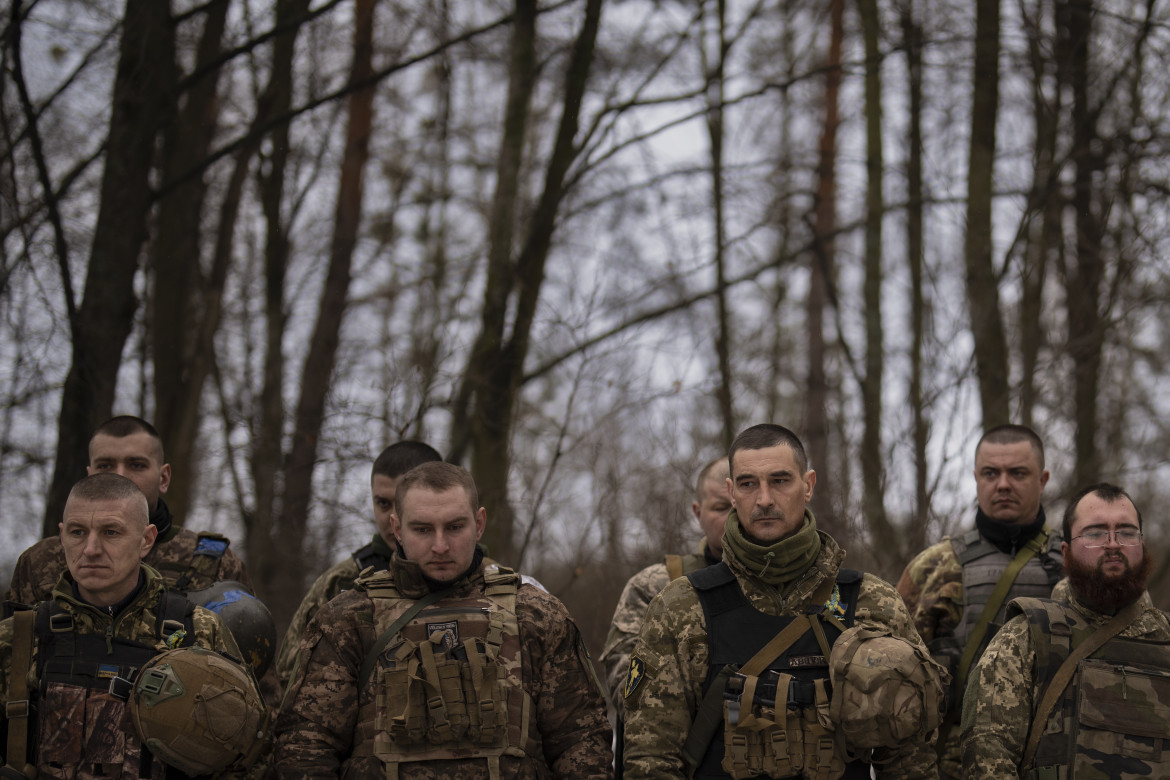Reportage
Ukrainian soldiers wonder: ‘What do Italians think?’
In the rare moments of pause at the front lines, there’s always someone from the soldiers asking us, “What do you think?” And “we” means the Italians, the French, the Germans, the West in short.

“What does Italy think about sending its soldiers here?” Sasha asks us while drinking tea. We are in a basement in Siversk, in what was once a pantry for canned goods and sausages. The family that lived in the now-half-destroyed house above was evacuated more than a year ago, and the basement has been repurposed as housing for the small unit led by Stepán, a former manager of a public company and now commander of a Territorial Defense division.
Sasha was an English teacher before the war, and he is keen to speak to us without the translator. “With NATO soldiers, the war would end immediately,” he insists. We tell him we think that’s impossible, that the war would spread like wildfire and become a worldwide conflict.
But for the Ukrainian soldiers, this view makes little sense: if they’re fighting, why couldn’t others fight as well? “Putin will not stop. If he wins here, he will go on to the Baltic countries and then Poland,” says Nikola; we’re speaking in English as he checks his smartphone for the latest in deep-sea fishing accessories. They all agree that Ukraine is just the first step in a larger plan. A kind of assault on the West, and they, as Ukrainians, feel they are its bulwark.
On this, both the government and military are bringing up the same points, a sign that the government’s communication strategy has worked. In the rare moments of pause at the front lines, there’s always someone from the soldiers asking us, “What do you think?” They actually want to know what we think, and “we” means the Italians, the French, the Germans, the West in short.
“Are there many who are pro-Putin in Italy?” Another difficult question; we’d have to explain that we don’t think the same way, that we don’t think not supporting Ukraine’s side necessarily means – or at least shouldn’t mean – the same as being pro-Putin fanatics.
But it seems like something from a bygone time to talk about peace with people who, every time they receive an order by radio, have to go out into the open, drive through a road with no cover, point their 57mm self-propelled cannon and fire in the hope of hitting the target and, most importantly, getting back to base alive and in one piece. Do peremohe, says young Dmitry, as if it were a toast: “To victory.” The soldiers nod gravely, then start laughing again as they remember Berlusconi: “He was great friends with Putin, right? What parties he was throwing back in his heyday.”
The order to position the cannon doesn’t come. Going out on the street is dangerous because of the drones: one risks being spotted and followed, blowing the cover of the entire unit. In the meantime, the artillery exchanges continue in the distance. So everyone stays underground, warming up by the cast-iron stove. The bunk beds – “built by Master Nikola” – are made from the doors of the house above ground. Those on the top bunk haven’t put on their uniforms and are sipping their tea in green tights. No matter how desperate the situation was, I don’t think it has ever happened that soldiers haven’t offered us something. They are sincere offers, not just meant to ingratiate themselves with the guest, and they are offended if you refuse.
“Meloni is on our side, right? Not like the one with the Putin T-shirt…” Sasha continues. Stepán interrupts him: “The fact is that the situation here will not change until they give us planes.” They all agree. “A year ago they said it had been decided. So, what’s up with that? Training is just an excuse, it’s not like our pilots are dumber than others.”
Dmitry has been at the front for a month, and in the army for four months. He is the driver of the unit and, given his young age, is something like the mascot of the group. They tell us that the day before he almost had a stroke when they were on their way to position the cannon and a metal song started blaring in the cabin.
“What are those psychos called?” asks Sasha, “Rammstein, Du Hast,” replies Dmitry. The song is a hit all over the Ukrainian front.
Louder sounds of explosions rattle the ceiling. We look at the soldiers to see if it’s time. But that’s up to Stepán; he’s the one who receives radio communications and only he knows the coordinates. We go up and find him focused on cleaning the large 57mm rounds in the wooden crates. “They’re blind rounds,” he explains. There are dozens more boxes behind him. Each salvo fires four, and they are loaded by hand. But he is not preparing to go out: “it’s just to keep busy.”
Since Russian drones have been controlling the skies above the Ukrainian positions, the waits have become much more boring, confined to the space of a few meters with always the same people. In the end, it has gotten dark and the order hasn’t come. The soldiers go back underground and we make our way towards the muddy road back to Kramatorsk.
Originally published at https://ilmanifesto.it/i-militari-ucraini-e-litalia-che-ne-pensa-nelle-trincee-ci-sperano on 2024-02-28
